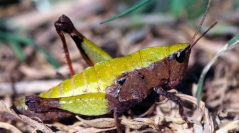

 Zoosystema
47 (24) - Pages 489-553
Zoosystema
47 (24) - Pages 489-553This paper presents the most comprehensive higher level phylogeny of the Acridomorpha to date, based on molecular data, clearly showing that the genera Mazaea Stål, 1876, Ixalidium Gerstäcker, 1869, Tangana Ramme, 1929 and Rowellacris Ritchie & Hemp n. gen., previously assigned to the Acrididae, belong to a single clade, constituting a previously unsuspected monophyletic family-level group that we are naming Ixalidiidae Hemp, Song & Ritchie n. fam. This paper combines molecular phylogenetics, morphotaxonomy, cytogenetics and bioacoustics to characterize this new family, and presents a comprehensive character table as context for its placement within the Acridoidea. The family Ixalidiidae Hemp, Song & Ritchie n. fam. currently comprises five genera, two from West and Central Africa: Mazaea and Barombia Karsch, 1891 and three from the montane and coastal forests of Tanzania and Kenya: Ixalidium, Tangana and Rowellacris Ritchie & Hemp n. gen. Three species originally described in Ixalidium are transferred to Rowellacris Ritchie & Hemp n. gen.: R. usambarica (Ramme, 1929) n. comb. (as type species), R. transiens (Ramme, 1929) n. comb. and R. obscuripes (Miller, 1929) n. comb. R. usambarica and R. obscuripes are recalled from synonymy under Ixalidium haematoscelis Gerstäcker, 1869. The monotypic genus Eubocoana Sjöstedt, 1931 is synonymised with Mazaea and the previously unknown male of Mazaea tristis (Sjostedt, 1931) n. comb. is described. Lectotypes are designated for Barombia tuberculosa Karsch, 1891 and for Ixalidium haematoscelis Gerstäcker, 1869. The paper describes the diverse and unusual morphology of the male and female genitalia and documents the exceptional chromosome number of Ixalidiidae Hemp, Song & Ritchie n. fam. and the drumming behaviour of Rowellacris Ritchie & Hemp n. gen. and Tangana. An unexpected sister-group relationship between the African Ixalidiidae Hemp, Song & Ritchie n. fam. and the South American Tristiridae revealed by the molecular phylogeny points to the existence of a common ancestor in Western Gondwana (Atlantica), predating the final separation of South America and Africa around the beginning of the late Cretaceous period 100 million years ago.
Acridoidea, molecular phylogenetics, phylogeny, Tangana, Eastern Arc Mountains, Cretaceous, new genus, new family